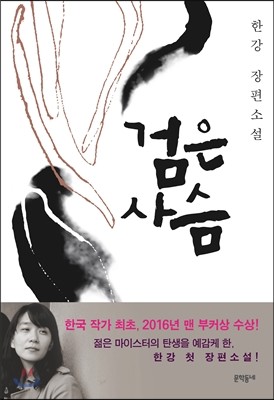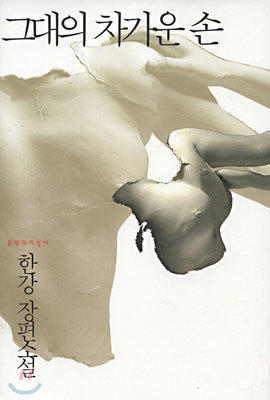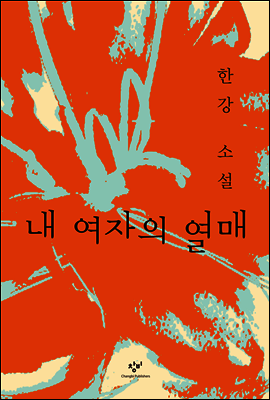Han Kang (born 1970) is a South Korean writer.
Life
Born in Gwangju in 1970, Han Kang made her literary debut as a poet in 1993 by publishing five poems including "Seourui gyeoul" (서울의 겨울 Winter in Seoul) in the quarterly Literature and Society. The following year saw her win the Seoul Shinmun New Writer's Contest for her short story "Bulgeun dat" (붉은 닻 Red Anchor). She published her first short story collection entitled Yeosuui sarang (여수의 사랑 Yeosu) in 1995. She participated in the University of Iowa International Writing Program in 1998 with support from the Arts Council Korea.
Her publications include the short story collections, Nae yeojaui yeolmae (내 여자의 열매 Fruits of My Woman), Norangmunui yeongwon (노랑무늬 영원 Fire Salamander); the novels Chaesikjuuija (채식주의자 The Vegetarian), Huirabeo sigan (희랍어 시간 Greek Lessons), Sonyeoni onda (소년이 온다 Human Acts), Huin (흰 The White Book), and Jakbyeolhaji anneunda (작별하지 않는다 I Do Not Bid Farewell); and the poetry collection Seorabe jeonyeogeul neoeo dueotda (서랍에 저녁을 넣어 두었다 I Put the Evening in the Drawer). She has received numerous awards including Today’s Young Artist Award, the Korean Fiction Award, the Yi Sang Literary Award, the Hwang Sun-won Literary Award, the Manhae Literary Award, the Kim Yu-jeong Literary Award, the Man Booker International Prize and the Malaparte Prize.
Work
The works of Han Kang have been enthusiastically received by both critics and readers alike for their profound exploration of human nature through the author’s delicate yet powerful writing style.
As if to say that our daily lives, the limited socially accepted ideas that support those lives, and furthermore, the condition of being human itself constitute an unbearable violence, Han's characters embrace their vivid, painful sensations and navigate their lives with refined fortitude.
The Vegetarian, Han’s first novel to appear in English, is a story in three acts: the first showing protagonist Yeong-hye’s decision and her family’s reaction; the second focuses on her brother-in-law, an unsuccessful artist who becomes obsessed with her body; the third on In-hye, the manager of a cosmetics store, trying to find her own way of dealing with the fallout from the family collapse. Across the three parts, we are pressed up against a society’s most inflexible structures—expectations of behaviour, the workings of institutions—and we watch them fail one by one. The novel repeatedly shows the frictions between huge passion and chilling detachment, between desires that are fed and those that are denied.[1]
Human Acts looks back at South Korean history from 1979 through the 1980s, when there was a dictatorship and assassinations, torture, civil unrest, and the slaughter of protesters. Han focuses on the infamous Gwangju Uprising and personalizes the resulting events through the death of a young boy. By integrating personal stories (based on her family’s experiences) with historical details, Han peels back layers of problems that have not been fully acknowledged or rectified with South Korean society and government.[2]
Han's latest novel, Jakbyeolhaji anneunda, is inspired by the civilian massacre on Jeju Island on April 3, 1948. Gyeong-ha, the protagonist, travels to Jeju at the request of her friend, In-seon. She is confronted with the family's painful past, notably that of In-seon's mother, Jeong-sim, who spent decades trying to find her brother who went missing in the 1948 massacre. The "utmost love" that Han speaks of is first and foremost found in Jeong-sim. But it also travels from Jeong-sim to her daughter In-seon, and from In-seon to her friend Gyeong-ha, neither of whom can escape the grip it has on their lives, despite the agony it entails.[3]
References
[1] Hahn, Daniel. “The Vegetarian by Han Kang Review – an Extraordinary Story of Family Fallout.” The Guardian, 16 Mar. 2018, https://www.theguardian.com/books/2015/jan/24/the-vegetarian-by-han-kang-review-family-fallout
[2] “Human Acts” Dublin Literary Award 2018 Shortlist, https://dublinliteraryaward.ie/books/human-acts/
[3] Lee, Haye-ah. “Han Kang Says New Novel Is about “Utmost Love.” Yonhap News Agency, 7 Sept. 2021, https://en.yna.co.kr/view/AEN20210907007000315
Han Kang, deren Name eine Anspielung auf den durch Seoul fließenden Hangang ist, ist die Tochter des Schriftstellers Han Seung-won (Han Sŭngwon) und wurde 1970 in Kwangju geboren, wuchs jedoch ab ihrem elften Lebensjahr in Seoul auf. Sie studierte an der Yonsei Universität Koreanische Literatur und graduierte dort im Jahr 1993. Han debütierte mit Gedichten, die in der Zeitschrift "Literatur und Gesellschaft" (Munhak-kwa sahoe) erschienen, bekannt wurde sie kurz darauf jedoch als Prosaschriftstellerin. 1994 gewann sie mit der Kurzgeschichte Rotes Segel (붉은 닻) den Literaturpreis der Zeitung Seoul Shinmun. Danach schrieb sie kontinuierlich und veröffentlichte mehrere Bände von Erzählungen. Im Jahre 1999 gewann sie einen Preis für den besten koreanischen Roman, 2000 den "Preis für junge Künstler von heute" des Ministeriums für Kultur und Tourismus und schließlich 2005 den Yi-Sang-Literaturpreis. Außerdem arbeitete sie als Journalistin für die Zeitschriften „Wasser der tiefen Quelle“, „Journal der Publikationen“ und „Quelle“. Ihr Werk Die Vegetarierin wurde 2010 verfilmt und der Kurzroman Baby Buddha diente als Grundlage für den Film Scar. Derzeit lehrt Han Kreatives Schreiben am Seoul Institute of the Arts.
Su primera obra "El amor en Yeosu" se publicó en 1995 y llamó la atención porque estaba narrada de forma precisa y firme. Escribió La vegetariana, que es la suma de tres cuentos relacionados: "La vegetariana", "La mancha mongólica" y "Los árboles en llamas". Se dice que se inspiró en un verso de Yi Sang: "Creo que las personas han de ser plantas", que Hang Kang interpretó como una posición contra la violencia del período colonial nipón. En 1993 comenzó su carrera literaria con el poema "El invierno de Seúl", que se publicó en la revista Literatura y Sociedad. Sin embargo, se ha dedicado más a la novela que a la poesía. Su prosa llamó la atención de los críticos y de los lectores por su estilo poético y sensual, y también por el carácter inquisitivo de sus obras. Hasta ahora ha publicado cuatro recopilaciones de cuentos: El amor en Yeosu, El fruto de mi mujer, Caja de lágrimas y El diseño amarillo de la eternidad; y seis novelas: El venado negro, Tus frías manos, La vegetariana, Pelea de aliento, La hora de griego y Viene el muchacho. Varias de sus novelas, como La vegetariana y La hora de griego, han sido traducidas al japonés, español, francés, vietnamita y otras lenguas. Han Kang ganó el Premio de Novela Coreana con su novela corta El niño Buda en 1999, el Premio al Artista Joven del Año en 2000, el Premio Yi Sang en el año 2005 por "La mancha mongólica" y el premio Dong-in en 2010 por Pelea de aliento. Bebé Buda y La vegetariana se han adaptado al cine.
La première œuvre de Han Kang, Un amour deYeosu (Yeosu-ui sarang) publiée en 1995, a très vite attiré l'attention de la critique en raison de sa narration fine et précise1. Han Kang a ensuite écrit La Végétarienne (Chaeshik ju-ui-ja) et son œuvre jumelle La Tache mongole (Monggo banjeom) malgré ses blessures aux poignets à la suite d'un rythme intense d'écriture à l'ordinateur. La Végétarienne est un recueil de trois nouvelles : La Végétarienne, La Tache mongole, et L'Arbre en feu (Namu bulkkot). Il a été dit que Han fut obsédée durant ses années universitaires par la poésie de Yi Sang et notamment ce vers : « Je pense que les humains devraient être des plantes », pensant que ce vers fut écrit en réaction face à la colonisation japonaise. S'inspirant de cet extrait de l'œuvre de Yi Sang, elle écrit son plus grand succès La Végétarienne.La carrière littéraire de Han Kang débute réellement avec la publication de cinq poèmes dont Hiver à Séoul (Seo-urui gyeo-ul), dans le numéro d'hiver de la revue Littérature et Société (Munhakgwa sahoe) en 1993. Sa carrière dans le genre de la fiction démarre l'année suivante avec son œuvre Ancre rouge (Bulgeun dat) qui remporte le concours printanier du quotidien Seoul Shinmun. Son premier recueil de nouvelles Un amour de Yeosu (Yeosu-ui sarang), a été publié en 1995. En 1998, Han Kang participe au programme international d'écriture de l'université d'Iowa. Son œuvre publiée en Corée inclut Le Fruit de ma femme (Nae yeoja-ui yeolmae, 2000), des nouvelles y compris Le Cerf noir (Geomeun saseum, 1998), Ta Main froide (Geudae-ui chaga-un son, 2002), La Végétarienne (2007), Pars, le vent se lève (Barami bunda gara, 2010), Leçons grecques (Hirabeo shigan, 2011). Han Kang est aussi par ailleurs musicienne et son œuvre reflète souvent cette passion.Han Kang a par ailleurs remporté le 25e concours de la Littérature coréenne avec sa nouvelle Bébé Bouddha (Agi bucheo) en 1999. Elle remporte aussi le prix littéraire Dong-ni en 2010 pour Pars, le vent se lève (Barami bunda, gara). Bébé Bouddh.
1994年、『ソウル新聞』新春文芸に短編『붉은 닻 (赤いアンカー)』が当選し、登壇した。 登壇後、『여수의 사랑 1995』, 『검은 사슴 1998』 などを作品を通じて、人間の根源的な悲しみやさびしさを表す作品を発表してきた。「緻密な細部、飛躍や断絶のない構成、豊富な象徴などで若いマイスターの誕生を予感させる」と破格の賞賛を浴びた。2005年には審査委員7人の満場一致で作品『몽고반점 』が李箱文学賞大賞を受賞した。李箱文学賞の歴史上、1970年代に生まれた初の受賞者だった。文学評論家の李御寧は、「 漢江の『몽고반점 』は、奇異な素材と独特な人物設定、混乱した話の展開で不自然な小説になる可能性もあったが、レベルの高い象徴性と優れた作法で面白い小説になっている」と評価した。
한강(1970~ )은 대한민국의 소설가다.
생애
한강은 1970년 광주에서 태어났다. 1980년 서울 우이동으로 이사하였으며, 1993년 연세대학교 국어국문학과를 졸업했다. 1993년 문학잡지 《문학과 사회》에 시 〈서울의 겨울〉을 발표하고, 이듬해에 서울신문 신춘문예에 단편소설 〈붉은 닻〉이 당선되면서 본격적으로 소설을 쓰기 시작했다. 이후 첫 소설집 《여수의 사랑》(1995), 첫 장편소설 《검은 사슴》(1998)을 출간하는 등 작품 활동을 이어갔으며 한국소설문학상(1999), 오늘의 젊은 예술가상(2000), 이상문학상(2005) 등을 수상했다.
2007년부터 서울예술대학교 문예창작과 교수로 일하기 시작했으며, 같은 해 연작 장편소설 《채식주의자》를 출간했다. 이 작품은 2010년부터 중국, 일본, 프랑스 등 여러 나라에서 꾸준히 번역, 출간되었으며, 작품성을 인정받아 2016년 영국의 맨부커 상 인터내셔널 부문을 수상했다. 또한 같은 작품으로 2018년에는 스페인에서 산클레멘테 문학상을 수상하였다.
2018년부터 소설에 전념하기 위해 재직 중이던 서울예술대학교를 사직했다. 이후로 장편소설 《작별하지 않는다》(2021)를 출간하는 등 꾸준한 작품 활동을 이어가고 있다.
작품 세계
한강의 초기 작품들은 주로 불행한 가족사나 트라우마와 같은 개인의 문제에 집중되어 있다. 작가의 첫 소설집 《여수의 사랑》(1995)에는 가족이 파괴되어 고아로 살아가거나, 정신적 상처를 입고 방황하는 외로운 사람들의 이야기가 담겨있다. 이 작품은 서정적인 문장과 섬세한 감수성으로 인간의 운명적 슬픔과 비극적 세계관을 드러내고 있으며, 거대 담론과 집단적인 상처 문제에 집중하고 있던 1990년대의 다른 소설들과 달리 개인의 내밀한 상처와 원초적인 기원을 탐구하고 있다.
영국의 맨부커 국제상을 수상한 작품인 《채식주의자》는 〈채식주의자〉(2004), 〈몽고반점〉(2004), 〈나무 불꽃〉(2005) 3편의 연작으로 이루어진 장편소설이다. 이 작품은 단편소설 〈내 여자의 열매〉(1997)의 모티프를 연작 장편 형식으로 변주했는데, 작가는 이 연작의 주제가 인간 탐구이며, 여성의 시각을 통해 식물성과 인간의 영성까지 그려 보고 싶다고 말한 바 있다. 한국 소설의 영역을 확장시킨 식물적 상상력이 특히 많은 주목을 받았다. 가부장적 폭력, 거식증 같은 현대적 소재와 여성이 나무로 변하는 신화적 이미지를 결합하여 언캐니(uncanny)의 형상을 창조했다는 평가도 있다.
이전의 작품들이 주로 개인의 문제에 집중하고 있었다면, 2014년에 출간한 장편소설 《소년이 온다》는 작가의 관심이 역사적 사건으로 옮겨졌다는 점에서 중요한 의미를 갖는다. 이 작품은 1980년에 일어난 광주민주화운동을 소재로 하여 당시의 상황과 이후에 남겨진 이들의 모습을 다루고 있다.
주요 작품
1) 소설집
《여수의 사랑》, 문학과지성사, 1995.(개정판, 문학과지성사, 2018)
《내 여자의 열매》, 창작과비평사, 2000.(개정판, 문학과지성사, 2018)
《노랑무늬 영원》, 2012.(개정판, 문학과지성사, 2018)
《흰》, 난다, 2016.
2) 장편소설
《검은 사슴》, 문학동네, 1998.
《그대의 차가운 손》, 문학과지성사, 2002.
《채식주의자》, 창비, 2007.(개정판, 창비, 2022)
《바람이 분다, 가라》, 문학과지성사, 2010.
《희랍어 시간》, 문학동네, 2011.
《소년이 온다》, 창비, 2014.
《작별하지 않는다》, 문학동네, 2021.
3) 시집
《서랍에 저녁을 넣어 두었다》, 문학과지성사, 2013.(개정판, 문학과지성사, 2020)
3) 산문집
《사랑과, 사랑을 둘러싼 것들》, 열림원, 2003.
《가만가만 부르는 노래》, 비채, 2007.
수상 내역
1999년 제25회 한국소설문학상
2000년 오늘의 젊은 예술가상 문학부문
2005년 제29회 이상문학상
2010년 제13회 동리문학상
2014년 만해문학상
2015년 황순원문학상
2016년 맨부커상 인터내셔널 부문
2017년 말라파르테 문학상
2018년 제12회 김유정문학상
2019년 제24회 아르세비스포 후안 데 산 클레멘테 문학상





